MASS CONSUMPTION: THE END OF AN ERA?
On Friday 24th April 2020, Fashion Revolution hosted our sixth annual Fashion Question Time, a powerful platform to debate the future of the fashion industry during Fashion Revolution Week. In light of current COVID-19 measures, Fashion Question Time was hosted in a new digital format.
This year’s theme, “Mass consumption: The end of an era?”, couldn’t feel more relevant to the present situation. Our current crisis has sparked a renewed desire to support each other in a time of uncertainty and is highlighting ways in which our personal habits can become more sustainable. We have been encouraging an end to overconsumption for many years, yet we also know that in the face of this unexpected halt in manufacturing, it is the most vulnerable, lowest paid people in the fashion supply chain that feel the worst effects. So, as we take this time to pause and reflect on our own consumption and disposal patterns, the question of how to support the millions of supply chain workers who have already lost their jobs remains largely unanswered.
MEET THE PANEL
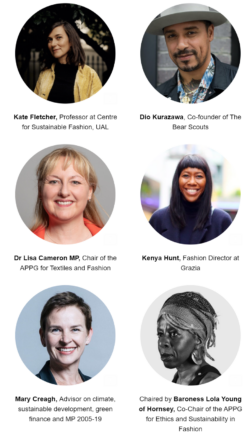
MISSED THE EVENT? WATCH FASHION QUESTION TIME AGAIN HERE:
Below we have selected some questions and answers that were discussed over the debate during Fashion Question Time 2020:
An opening speech was made by Carry Somers, co-founder and Global Operations Director of Fashion Revolution, speaking of her recent voyage in the Pacific researching microplastics, she said:
And there in the middle of the ocean, I confronted the signs and symbols of our consumption, across the pacific seascape. I witnessed the reflection of our age of excess in the surface of the sea, in the trail of plastic waste which has been left in the wake of uncontrolled growth. So our challenge this decade is to move beyond our currently destructive and western world view which is tipping us into a climate catastrophe and a plastic pollution crisis, towards a fashion industry that integrates nature in a truly sustainable way.
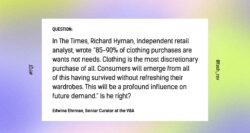
The first question was submitted by Edwina Ehrman, Senior Curator at the V&A, focussed on how clothing demand may change post-COVID.
Kenya Hunt, Fashion Director, Grazia:
We’re already seeing a change in demand and I think that largely boils down to the economy which is in a state of free fall. I read that 75% of consumers in Europe and the States, believe that their personal finances are being negatively impacted by this pandemic. So that alone is, it is impacting demand. On top of that, we were seeing a gradual shift and mindset with consumers in general as awareness spreads of how overconsumption has a negative toll on the planet.
Mary Creagh, Advisor on climate, sustainable development, green finance and MP 2005-19:
I think there’s a radical change coming – we’ve seen collapses in sales. I’m sure China is seeing a boom but that’s because nobody’s bought anything that for three months. So what happens when the sort of pent up demand, the people who want those handbags or want those top items? What happens when they stopped buying those things? They’ve got what they want. What’s clear is there’s a collapse in sales, an absolute collapse.
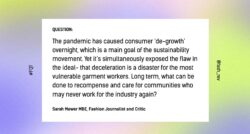
The following question by Sarah Mower MBE explored current reduction in growth and its impacts on garment workers.
Kate Fletcher, Centre for Sustainable Fashion, UAL:
De-growth is not the same as negative growth. And what we’re experiencing at the moment is negative growth. And I think it’s really wholly wrong to assume that what is happening now in the fashion sector in any way gives us a full taste of what will happen if we engage with de-growth ideas fully. So what growth is, is it’s the process of accumulation of capital and wealth. Whereas de-growth by contrast, it’s not an economic concept wholly. It really involves the whole of society. It asks questions about values and representations and it’s about examining consumption of natural resources and energy but within the carrying capacity of the planet.
Dr Lisa Cameron MP and Chair of the APPG for Textiles and Fashion:
There are massive global issues to consider in terms of appropriate wages for those workers internationally and how we’ll attempt to support them in when they are in poverty. There are also issues for the UK in terms of the fashion industry to take forward, which have been thrown into this conversation and we’re looking at trying to address some of those. That might be something that that moves forward progressively as a result [of this pandemic].
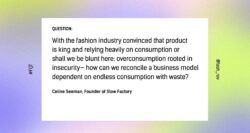
Celine Seeman, Founder of Slow Factory, submitted a thought-provoking question on how we can reconcile the current business model dependent on consumption.
Dio Kurazawa, Cofounder, The Bear Scouts:
This is about capitalism. And I think it’s very key to note that she said that this is rooted in insecurity. Yes. that’s correct. We don’t need to buy all the things that we do buy. But these businesses have been set up in order to perpetuate overconsumption. I think the real answer to this is really innovation. It’s about how things are made. Are they adopting circular methods? The other thing is that brands don’t look at their supply chain as partners. A lot of my manufacturing clients have been left in the dark by Arcadia group, for example, who’s left one of my manufacturers with a bill of around 400,000 pounds in cancelled orders.
Kate Fletcher, Centre for Sustainable Fashion, UAL:
The fashion industry has been set up to make us spend money we don’t have on things we don’t need to impress people we don’t much care about. And so as we’re going forward, it is important for us to, to recognize that the business model that underpins the current fashion sector is based on a logic of economic growth. Other logics and other business models are available. It’s not the only world, we created this and we can create something else. We need business as part of a solution moving forward.
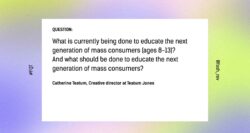
The next question by Catherine Teatum, Creative Director at Teatum Jones, focussed on educating the next generation.
Kate Fletcher, Centre for Sustainable Fashion, UAL:
The education of this group is mainly currently handled by the marketing departments of brands. And this is really shocking, isn’t it? The economic growth focus that’s so prevalent in society means that consumption really isn’t critically considered in schools and across the curriculum. There isn’t a coherent critique of what consumption practices mean in the school curriculum in the UK at all.
Dio Kurazawa, Cofounder, The Bear Scouts:
I think it’s really about coming together and working with a variety of folks who may not be embracing responsible fashion or climate change, but maybe they have the platform that prevails for that demographic. I think we need to work together across industries in order to get this message across.
Mary Creagh, Advisor on climate, sustainable development, green finance and MP 2005-19:
I think this virus is an opportunity for us to sit at home and talk about how we learn and what we learnt. And when we had our inquiry, we had a lecturer from Leeds College of Fashion who said, ‘one of my students said I’m going to have to go and get a new coat because the buttons come off this one’. The fact that you’ve got fashion students, and I’m not saying this is universal but it was anecdotal evidence, that can’t sew on a button. When 20 years earlier, you have 11 year olds that can do blanket stitch and chain stitch. Once you’ve made something and sweated over it for hours, you’re much more likely to throw it out because you actually understand the making and creation that went into it.
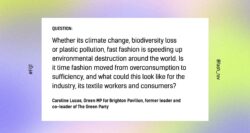
Caroline Lucas, MP for Brighton Pavillion and former leader of the Green Party, asked what a world could look like if we moved away from consumption to a model of sufficiency.
Mary Creagh, Advisor on climate, sustainable development, green finance and MP 2005-19:
How do brands in fashion 2.0 make deeper relationships? They know their staff here in this country. Why can’t they know their staff in Bangladesh, in China? And why can’t they look after them in the way that they look after their workers here? And if you go back to Salts Mill and Salter or Bournville for Cadbury’s, some of those great industrialists realised their workers were living in awful conditions and created model villages for them. I think there’s something there about knowing your workers better.
Dio Kurazawa, Cofounder, The Bear Scouts:
We just now have a new launch of a new innovation that allows you to feel the fabric of a garment just through your mobile phone. So there are a lot of innovations that are out there. The problem is fast fashion won’t pay for it because the model of the fast fashion is built on does not allow for such a thing. It’s based on spending little but having a big margin to sell in order to get a profit. And until that shifts, until you can regulate, at least the businesses within the UK who are going way over to the far East in order to take advantage of these lower prices, then we’re never really going to get anywhere.
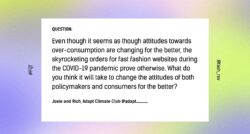
A question from Josie and Rich, Adapt Climate Club, explored how we can change attitudes of consumers and policymakers.
Kenya Hunt, Fashion Director, Grazia:
I work on the B2C side of things, so I’m always speaking to the consumer at the magazine. I think it’s about just really constantly showing them how their habits really impact one’s day to day life. I was talking to the designer Bethany Williams and she was saying that if people knew that when you order multiple sizes and you keep one and you send the others back that they may be burned, that they probably wouldn’t do it. So, I think educating them essentially to the high cost, the very high cost of cheap clothing, should be number one.
Dr Lisa Cameron MP and Chair of the APPG for Textiles and Fashion:
We need to make it more obvious for consumers, perhaps like a traffic light system of green, amber and red in relation to different aspects of manufacturing. There’s some resistance obviously from the industry itself. So, I think it’s going to be a combination of shifting our education for young people to make sure that they understand the global goals, the sustainable development goals, by combining that with some regulation.
Orsola de Castro, co-founder of Fashion Revolution closed Fashion Question Time with a speech:
We will have to look for balance after all this. Let’s ensure this period of restrictions won’t be followed by one of hyper excesses, of business as usual times 10. There are ways to make an adequate amount of products, providing dignified work to the people who make them, while protecting and conserving our environment – we have to invest in them and implement them with rigour. So the call to action from this FQT couldn’t be more simple. Go back to the event’s title: Mass consumption – the end of an era? And the remove the question mark. Mass consumption – the end of an era. FULL STOP.
We are so grateful to Baroness Lola Young of Hornsey for chairing our first *virtual* Fashion Question Time event, and to our brilliant panellists, Mary Creagh, Kenya Hunt, Dr Lisa Cameron MP, Kate Fletcher and Dio Kurazawa. In addition, we would like to thank Edwina Ehrman and the team at the V&A for their continued support despite the circumstances.
There are three things I have been passionate about over the course of my life: sailing and the sea, the indigenous cultures of South and Central America, and creating a more sustainable fashion industry.
Working with Pachacuti, the hat brand I founded over two decades ago, and at Fashion Revolution over the past six years, has brought together the latter two areas in many ways, but now I am incredibly excited to be able to draw all three of these strands together. In February and March 2020, I will be setting sail with eXXpedition to investigate plastic pollution and toxics in our oceans. Almost 10,000 women from around the world applied to take part in the two year voyage and I feel incredibly fortunate to have been selected to crew on the leg from the Galapagos to Easter Island.
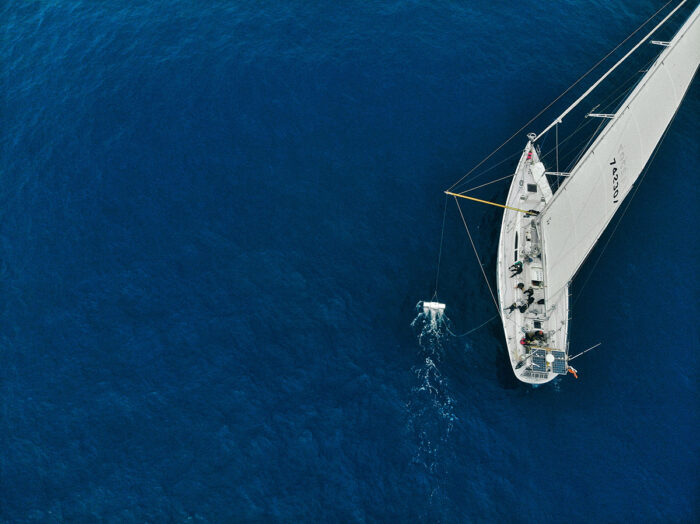
I learnt to sale on the magnificent J-Class yacht Velsheda in the late ’80s and spent a few summers as crew before jumping over to the square rigged brig TS Astrid on which I spent many happy months sailing the Channel and taking part in the Tall Ships Race. I then worked on various boats in the Caribbean for a year and sailed across the Atlantic on the tops’l schooner TS Unicorn. I remember night after night on the seemingly pristine sea watching the glowing, glittering phosphorescence resulting from the bioluminescence of organisms in the surface layers of the sea (we took two months crossing the Atlantic so there were plenty of sea sparkle nights to enjoy!) I never imagined that I would be sailing the oceans again three decades later to carry out research into the degradation of the marine environment.
My Masters in Native American Studies at the University of Essex was the culmination of an interest in the Andean region which stemmed from somewhere far back in my childhood – I remember asking for a picture book about the Incas as a Christmas present one year when I was still quite young. I immersed myself in learning about indigenous cultures past and present and would have continued with my PhD on the symbolism of colour and natural dyes in the Andes. However, having set up Pachacuti in the summer holidays and seen at first hand the real difference fair trade could make to textile-producing communities in Ecuador, I decided to turn my interest in the region to more practical use.
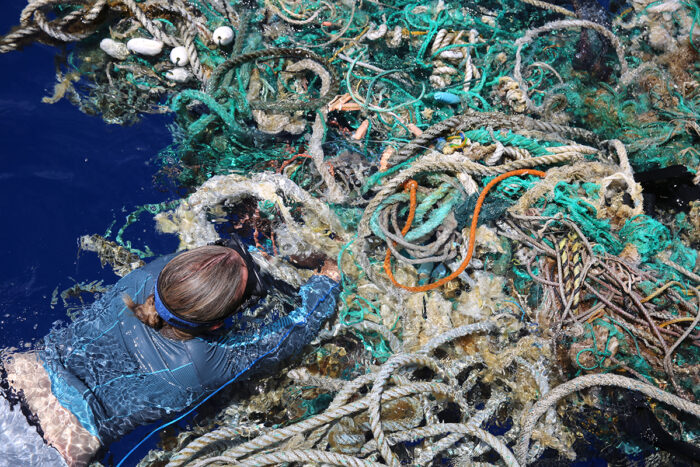
One of the key concepts of the Andean worldview is ayni, meaning reciprocity and balance. Balance does not mean just a static equibrium; the Inca strived for the creation of an animated cosmos through a system of continual exchange based on mutual respect, justice, and solidarity. They saw reciprocity as the foundation for peace, resilience and enduring relationships with our environment and our community both near and far. Ayni was a continuous accompaniment to life in the Andes and the foundation on which society was based. Indeed, life itself can be seen as ayni.
If the equilibrium between communities and the natural world was altered, it could result in floods, or lack of rains. Andean peoples understood that ayni has to be recreated every day in order for regeneration to take place and, as a result, knew that they needed to give things up, to make sacrifices to restore balance. Reciprocity moves people beyond self interest in order to do something for the common good.
Perhaps it is not surprising that in 2008, Ecuador became the first country to legally recognise the rights of nature and two years later Bolivia adopted the Law of the Rights of Mother Earth. This means in practice that people can now sue on behalf of the ecosystem. The Ecuadorian Constitution says this will help to “achieve the good way of living, the sumac kawsay.” Nature is part of the social fabric of life, not a resource to be exploited. The Andean concept of good living or living well doesn’t mean living better than others, nor does it imply the accumulation of material wealth. It means living well together, with nature, with mutual support, with ayni.
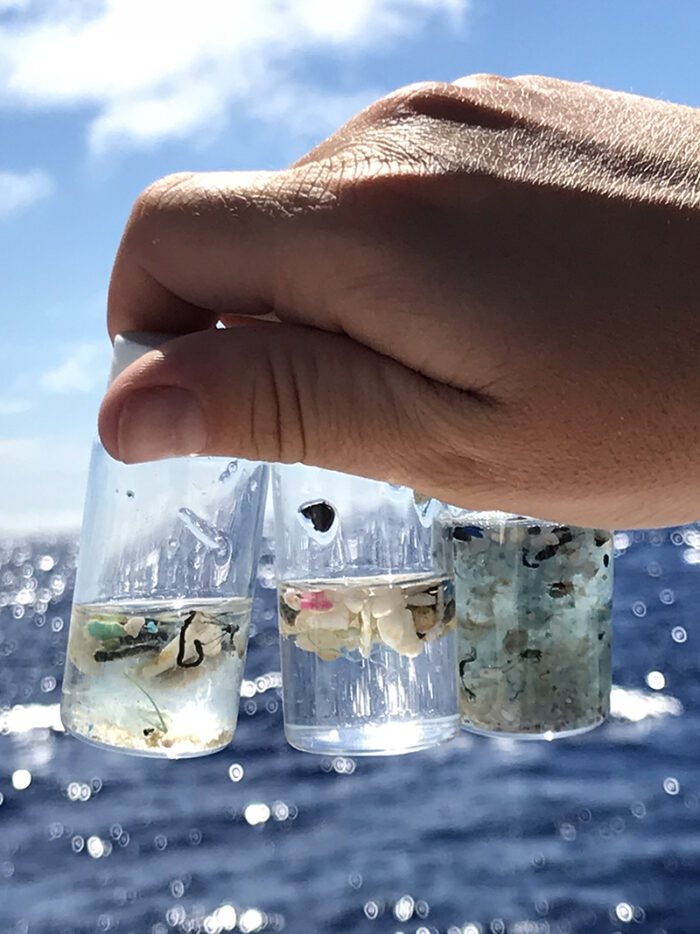
I was reminded of this whilst on holiday this summer, in a chalet by the sea on Branscombe beach in Devon. I was working there with my daughter, Sienna, and we were discussing stakeholders for Fashion Revolution’s policy dialogue toolkits. She told me that we must make sure we include stakeholders who don’t have a voice like the ocean and marine life. It seemed so obvious once she said it and I was astonished I had never previously thought of including them. This just emphasised to me how far we have become detached from seeing our world as a living being.
Reciprocity is inherent in the way the earth works, although there are limits that are difficult to reverse once they are crossed, as set out in the UN United in Science report issued on 22 September. Our activities, our pollution, our degradation of the marine environment are stressing the earth’s natural capacity for reciprocity. If we are to tackle toxics and plastic pollution in our oceans, as well as climate change, waste, and the myriad other environmental issues relating to the fashion industry, we know that every choice and every action matters. If we want to see regeneration of our waterways and oceans which are essential for living well on this planet together, we need to take co-operative responsibility. The resources of both land and sea are a gift, and this gift requires reciprocity in order to maintain healthy ecosystems.
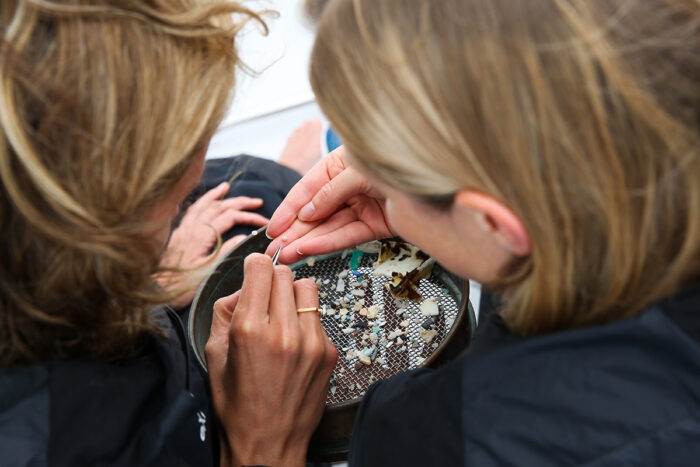
When I join eXXpedition and sail some 2000 miles through the Pacific Ocean, I will be taking part in groundbreaking scientific research on board this floating laboratory to help build a comprehensive picture of the state of our seas. I will also be helping to unravel how we got into this mess and how we can help shift our mindsets towards a more sustainable, a more balanced, future which encourages progress to a more regenerative system. The worldview of the peoples who inhabit the countries past which I will be sailing may well help us to find some of these solutions.
***
The eXXpedition Round the World voyage, which sets sail from Plymouth, UK on October 8th 2019, will sail through some of the most important and diverse marine environments on the planet. This includes crossing four of the five oceanic gyres, where ocean plastic is known to accumulate, and the Arctic on board 73ft sailing vessel S.V. TravelEdge. Under the directorship of award winning ocean advocate Emily Penn, 300 women will join the research vessel as crew over 30 voyage legs to journey more than 38,000 nautical miles. Follow news and updates via #eXXpedition @exxpedition on Twitter / @exxpedition_ on Instagram /eXXpedition on Facebook
I am looking for sponsorship and donations towards my participation in this groundbreaking voyage. Please see more information here – I am very grateful for any support.
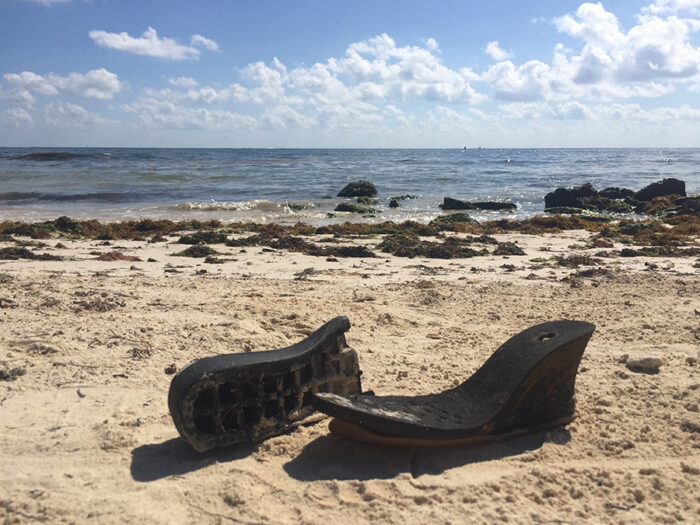
Header photo: Soraya Abdel Hadi/eXXpedition
La semana pasada en Copenhagen Fashion Summit, Juan Orlando Hernández, Presidente de Honduras hizo la siguiente invitación: “Si quisieran ir a Honduras a conocer por ustedes mismos, yo los recibiré personalmente en el aeropuerto”.
Ignorando las molestias en la parte posterior del auditorio que llamaron “Señor Presidente, detenga a los militares de asesinar a activistas” el Presidente de Honduras lanzó para promocionar el país como líder de exportación de prendas a Estados Unidos de América y tiene el objetivo de exportar más al mercado Europeo. La industria del vestir y textil es parte del nuevo plan Honduras 2020, un proyecto de $3.4 miles de millones, que tiene como meta hacer que Honduras sea la elección de muchas marcas para proveer de forma sustentable. “Haremos esto mediante un verdadero modelo sustentable, enfocándonos en factores clave como condiciones laborales sustentables, protección del medio ambiente, utilizando la última tecnología para reducir el consumo de los recursos, cambiando los combustibles a energías renovables” mencionó Juan Orlando Hernández, quien continuaba enfatizando el objetivo de su país por tener el 80% de sus energías de origen renovable para el 2020.
El compromiso por reducir los combustibles no renovables claramente no exenta al mismo Presidente, quien rentó un jet de lujo para ir a la conferencia de Vista Jet, entre sus clientes tienen a celebridades como Beyonce y los Beckham. La presentación del Presidente le costaría $360,000 viajando solo, de acuerdo con la información del sitio, dando esto decenas de críticas en la página de Facebook de Copenhagen Fashion Summit.
El Presidente seguía mencionando a las 1200 personas del público haciendo hincapié en cómo su país toma muy en serio el lado social de la sustentabilidad. “Gozamos de un excelente y seguro ambiente de trabajo y cuidar a nuestra gente es nuestra principal atención y responsabilidad”.
El Presidente llegó a decir que Honduras era “el segundo lugar más justo para la producción de prendas de vestir”. Después de un correo electrónico al Americas Apparel Producers’ Network, he recibido una respuesta del Director General Mike Todaro quien aclaró que el Presidente se refería al AAPN Asia/Americas Report Card. Honduras llegó al 2º lugar en el informe. Sin embargo, por lo que yo puedo ver a partir de la información en línea, sólo uno de los 8 criterios se refiere a cumplimiento social y sostenibilidad y los otros 7 incluyen elementos como el coste, la velocidad y el desarrollo de productos.
De acuerdo con War on Want, 53% de los trabajadores en maquilas o fábricas de ropa, en Honduras son mujeres jóvenes de comunidades desfavorecidas que tienen poca educación. La mayoría no son conscientes de sus derechos, la explotación es frecuente y los trabajadores están desmotivados a formar sindicatos. Solidarity Center dice que los sindicalistas son constantemente amenazados, intimidados, extorsionados e inclusive asesinados, y los criminales rara vez puestos a disposición judicial.
31 sindicalistas han sido asesinados y 200 heridos en ataques desde el 2009, de acuerdo con la federación de sindicatos AFL-CIO. De hecho en Marzo del año pasado en Departamento Americano del Empleo publicó un informe documentando abusos a los derechos de los trabajadores en Honduras. El informe detalla muchos casos donde los empleados hondureños relacionados en actos de discriminación anti-sindicalistas, imponiendo pactos anti-sindicalistas para frustrar negociaciones colectivas, así como casos donde no se pagan los salarios, exigir horas extras y numerosos abusos en cuanto a salud y seguridad laboral.
En promedio los salarios de las maquilas son equivalentes al 37% del costo de la canasta básica de Honduras. Además la diferencia entre los salarios de los trabajadores de maquilas y los de las otras industrias está en crecimiento. La competencia a la base continuará a menos que tomemos un acercamiento para tener un salario para vivir, trabajando con los gobiernos y sindicatos para ajustarlo de manera legal, imponiendo un salario mínimo en su país que asegure que los empleados puedan cubrir sus necesidades básicas.
Sin transparencia en la cadena de suministro y sin compromiso de los dueños de las marcas de moda y las fábricas de invertir en mejores condiciones laborales, los salarios y derechos de los trabajadores se mantendrán desempoderados y no podrán negociar de manera independiente sus condiciones laborales.
La industria textil y de la moda sin duda a traído trabajos al país, pero no son buenos empleos. Frecuentemente se discute si cualquier trabajo es mejor que no tener trabajo, pero no hay motivo por el cual no crear buenos empleos, trabajos con dignidad, sin tener un impacto en el precio de venta. El hecho de que la gente está en una situación difícil no es motivo para explotarla. Una Fashion Revolution es necesaria dado que las marcas, incluso las mejores marcas quienes están trabajando de manera proactiva hacia un salario para poder vivir, nunca cambiarán el sistema.
Deberían venir a ver si estos empleos realmente ayudan a las personas a salir de la pobreza, con los salarios que reciben, sin derechos laborales. ¡No tienen un lugar para sentarse a comer, tienen que comen en las calles y regresar al trabajo! ¡En verdad se creyeron lo que este hombre fue a decir a su evento! Comentó RS Briose en la página de Facebook de Copenhagen Fashion Summit.
En respuesta a RS Bruise y otros ciudadanos Hondureños quienes comentaron sobre la visita de Juan Orlando Hernández a Copenhagen Fashion Summit: Sí, visitaremos y veremos con nuestros propios ojos #whomademyclothes #quienhizomiropa. Iremos a ver si Honduras es realmente uno de los lugares con las mejores condiciones sociales en el hemisferio oeste para la producción de ropa y textiles, tal y como se indica en la presentación del Presidente.
Estoy lista para aceptar el ofrecimiento del Presidente de Honduras para visitar las fábricas de su país y confío en que mantendrá su palabra. Presidente, nos vemos en el aeropuerto.
At the Copenhagen Fashion Summit last week, Juan Orlando Hernández, President of Honduras, issued the following invitation: ‘If you would like to go to Honduras to look around for yourselves, I will be personally at the airport waiting for you’.
Ignoring the heckler at the back of the room who called out ‘Mr President, stop the military from murdering community activists’ the President of Honduras launched into a promotion for his country as a leading garment exporter to the US and his ambitions for a larger European market share. The garment and textile industry is part of the newly launched Honduras 2020, a $3.4 billion project which aims to make Honduras into the country of choice for brands and retailers wishing to source sustainably. ‘We will do this through a real sustainable model focussing on key topics such as sustainable working conditions, protecting the environment, using the latest technology to reduce consumption of resources, moving from fossil fuel to renewable energy sources’ stated Juan Orlando Hernández, who continued by highlighting his country’s ambition to source 80% of its energy from renewable sources by 2020.
The commitment to reduce fossil fuels clearly doesn’t extend to the President himself, who rented a luxury jet to fly to the conference from Vista Jet, whose clients include celebrities such as Beyonce and the Beckhams. The President’s short presentation would have cost $360,000 in travel alone, according to one source, prompting dozens of critical comments on the Copenhagen Fashion Summit Facebook page.
The President continued to address the 1200-strong audience by underlining how seriously his country takes the social side of sustainability. ‘We enjoy an excellent and safe work environment and taking care of our people is our main focus and our responsibility’.
The President went on to say that Honduras was ‘the second most fair location for garment production’. After an investigatory email to the Americas Apparel Producers’ Network, I received a response from Managing Director Mike Todaro who clarified that the President was referring to the The AAPN Asia/Americas Report Card. Honduras came 2nd overall in the AAPN Report Card which is completed by sourcing executives. However, as far as I can see from online information about the Report Card, only one out of the 8 criteria relates to social compliance/sustainability and the other 7 include elements like cost, speed and product development.
According to War on Want 53% of garment workers in maquilas, or garment factories, in Honduras are young women from deprived backgrounds who have little education. Most are unaware of their rights, exploitation is widespread and workers are actively discouraged from joining unions. The Solidarity Center says trade unionists are routinely threatened, intimidated, harassed and even murdered, with the criminals rarely brought to justice.
31 trade unionists have been assassinated and 200 injured in attacks since 2009, according to the umbrella federation for US unions AFL-CIO. In fact, in March last year the US Department of Labour issued a damning 143 page report documenting widespread and serious violations of labour rights in Honduras. The report detailed numerous cases where Honduran employers engaged in acts of anti-union discrimination, imposing non-union pacts to frustrate collective bargaining, as well as cases of non-payment of wages, forced overtime and numerous occupational health and safety violations.
On average, the wages earned in maquilas are equivalent to only 37% of the cost of the basic basket of consumer goods in Honduras. Moreover, the gap between wages for workers in maquilas and those in other industries is widening. The race to the bottom will continue unless we take a systemic approach to the issue of a living wage by working with governments and unions to set a legal, enforceable minimum wage in their country which ensures workers can meet their basic needs.
Without supply chain transparency and a commitment from fashion brand owners and factories to invest in better working conditions, living wages and workers’ rights, garment workers will remain disempowered and unable to independently negotiate labour conditions.
The garment and textile industry has undoubtedly brought jobs to the country, but not necessarily good jobs. It is often argued that any job is better than no job, but there is no reason why we can’t be creating decent jobs, jobs with dignity, without any significant impact on the retail price. The fact that people are desperate isn’t an excuse to exploit them. A Fashion Revolution is needed because brands, even the best of the brands who are working most proactively towards a living wage, will never change the system.
‘You should come see if this jobs really help people get out of poverty, with the kind of wages they make, with no labor rights. They are not even given a place to have their meals, they have to take lunch in the street and then come in back to work! Did you really believe what this man went to say to your event!’ commented RS Bruise on the Copenhagen Fashion Summit Facebook page.
So, in response to RS Bruise and all the other Honduran citizens whose commented on the visit of Juan Orlando Hernández to the Copenhagen Fashion Summit: Yes, we will come and see for ourselves #whomademyclothes. We will come and see whether Honduras really is one of ‘most fair social locations in the Western hemisphere for garment production’, as claimed in the President’s presentation.
I am ready to take the President of Honduras up on his offer to visit garment factories in his country and trust that he will keep his word. Meet me at the airport, Mr President.
On Monday 29 June 2015 in the UK House of Lords, industry leaders, press and political leaders attended the roundtable debate Ethical Fashion 2020: a New Vision for Transparency. The aim of the event was to help to shape a vison of what transparent supply chains could look like in five years time and set out what steps are needed to transform the fashion industry of the future.
The event at the House of Lords, now in its second year, was co-hosted by Fashion Revolution, the Institution of Occupational Safety and Health (IOSH) and the All-Party Parliamentary Group on Ethics and Sustainability in Fashion.

Introducing the event, IOSH Chief Executive Jan Chmiel said
“Transparency matters because it can drive improved workplace standards. It can also increase recognition of good health and safety performance. And importantly, it can help ensure more people view health and safety as an investment, not a cost – one that saves lives, supports business and sustains communities. Whereas, a lack of transparency can do the reverse. Crucially, it can mean that firms don’t know the factories that are supplying them, so they can’t actively manage their risks – potentially leading to tragedy, disaster and business failure”.
Co-founder of Fashion Revolution, Carry Somers, set the scene as to why transparency is a crucial issue to address over the next 5 years
“So much is hidden within the industry, largely because of its scale and complexity. The system in which the fashion and textiles industry operates has become unmanageable and almost nobody has a clear picture how it all really works, from fibre through to final product, use and disposal.
The low or non-existent levels of visibility across the supply chain highlight the problematic and complex nature of the fashion industry. A few brands have received a lot of public pressure to publish information about their suppliers and some have responded by disclosing parts of it. Yet, the rest of the industry remains very opaque. It’s not just brands; it’s the myriad other stakeholders along the chain too. We believe that knowing who made our clothes is the first step in transforming the fashion industry”.
The two hour debate, chaired by Lucy Siegle, acknowledged where progress needed to be made, highlighted opportunities for change and set out a vision for how the fashion industry could and should look by 2020.
Some of the key points made by the speakers are set out below:
Peter McAllister, Executive Director of the Ethical Trading Initiative
- We need to break down what transparency looks like and define what the journey looks like, so we get a virtuous circle.
- Smart regulation drives behaviour. Once the environment is predictable, business can work within that environment. What is difficult is when business can’t predict when wages will rise or fall, when there will be a strike, etc.
- We need mechanisms where workers are represented not where they are just at the receiving end of good intentions
- We want to see the UN Guiding Principles on Human Rights become a rallying call to transform fashion industry and see this fully implemented by 2020. Companies need to undertake human rights due diligence, understand the impacts and take the remedial action required. This underpins the need for transparency.
- We can’t wait for a crisis – we need to put national and private mechanisms in place. We need to set up platforms in key places such as China and India to influence change in producer countries.
- Bangladesh is still a young country with weak infrastructure. The Accord and the Alliance were the right response at the right time. It is an attempt to turbocharge the effort of the Bangladesh government to set up their own mechanisms. It is designed to be a contribution to a longer term shift, of which we are yet to see the green shoots.
- Transparency is coming at companies, whether they like it or not – better to get ahead of the curve. The best way to get change is to inspire competition between companies.
- This sector is well overdue transformative change, not just twiddling at the edges
Rob Wayss – Executive Director of The Bangladesh Accord
- Accord signatories were placing “unprecedented” requirements on their suppliers.
- Even though there had been a positive response to the Accord, much more needs to be done including the increasing the pace of remediation works in factories and ensuring workers are able to raise safety concerns without fear of reprisal. If other workers see that raising safety concerns leads to hassle, they won’t express worries themselves.
- The Accord is based on a 5 year agreement. Health and Safety Committees have been put in place in all factories, remedial action is being taken, factories are working with union representatives.
- Transparency is the key to progress and the way the Accord works. We publish inspection and disclose non-compliance.
- Inspections for the Accord were carried out by world class engineers who worked alongside Bangladeshi engineers. I would like to see the assessments based on scientific engineering principles.
- Money, resources and political will are needed to change the way we do business.
- A kite mark on garments to verify ethical production would be very difficult as would need to verify what is the standard, who is assessing and monitoring. It is very high risk and it is not very meaningful, even though there is an appetite for this amongst consumers.
- The media has an important role to play as it creates pressure. Where there are legitimate article expressing valid criticisms, we respond accordingly. However, some articles in the Bangladeshi press were perhaps generated by factory owners who wanted to see the pace of the Accord slowed down.
Baroness Young of Hornsey – All-Party Parliamentary Group on Ethics and Sustainability in Fashion.
- You can only make a choice if you have information and that information turns to knowledge
- More businesses need to be more honest.
- We need to think more creatively and outside of the box of usual business models.
- Legislation won’t solve the whole problem but it can promote cultural change, as we’ve seen with the Equality Act.
- The government had to be encouraged to put the transparency clause in the Modern Slavery Bill in place by business. Loopholes in law which still exist around Modern Slavery Act will be stricter by 2020.
- The fashion industry is different to other industries as it has such a widely distributed supply chain. I’d like to see pressure building so companies can make progress on their public statements over the next five years as to how they are addressing modern slavery within their supply chains.
- We need more empowerment of consumers, business and politicians so this becomes so much part of life that we don’t need to think about it.
- The idea of a kite mark on the surface seems attractive but it simplifies what is an incredibly comples area. How do you make calculations which balance the social and the environmental?
- We can’t assume Made in Britain is OK. One member of the APPG saw conditions in a garment factory in East London last week as bad as those you would see anywhere in the world.
Simon Ward – British Fashion Council (BFC)
- The BFC has a three-year strategy to put sustainability at the heart of all we do. BFC is undertaking a collaboration with Marks and Spencer through the Positive Fashion initiative to promote best practice in order to stimulate real and meaningful change, highlighting the practical toolkit for designers which incorporates sustainability.
- There is a a need to find creative solutions and look at things differently. For instance, the BFC worked with the government to set up a draft standard on fashion apprenticeships as a solution to the problem of unpaid interns.
- We’re on an endless hamster wheel, more & more, cheaper & cheaper. How can we break the madness & tell a positive, creative story? People warm to the story and telling the story behind an item of clothin is an entrancing way to give insight into the people behind the clothes. It provides a compelling motivation for change.
Garrett Brown of the Maquiladora Health and Safety Support Network
- We need public listing of supply chains
- We need public disclosure of monitoring timelines and remedial action
- We need meaningful participation by workers, including training to give them the information and authority to act without retaliation.
- Sourcing is currently driven by the lowest price, highest quality, fastest delivery, with a window dressing of CSR.
- It is a pre-requisite that governments have the will and the resources to enforce the regulations, but in most places in the developing world this isn’t the case. In Bangladesh, it should be the government enforcing regulation and the Accord is a real step towards achieving this. Mexico has strong health and safety legislation, as strong as the US, but it has high foreigh debt, so won’t do anything to deter investents. This is why workers need to protect themselves.
- Transparency is only as good as the information that you get
Finally, Lucy Siegle asked the panellists what one thing would make a massive difference by 2020?
Garrett Brown: The Accord model of public discoloure is critical. Brands have to disclose where their factories are and tell us about the conditions.
Simon Ward: A lot of big and complex change is required. We need a magic story to tie it all together so it is understandable.
Baroness Lola Young: Information leading to activism. Supporting organisations like Fashion Revolution which are build on the work of other organisation like the EFF, ETI, Labour Behind the Label. Information needs to be acted on and we need coalitions like Fashion Revolution which can lobby for change.
Rob Wyass: Audits, credibly performed
Peter McAllister: The ETI has made a commitment to develop a public form of the audits of their companies which we hope will showcase some of the best performers.
After the debate, guests adjourned to River Room, overlooking the Thames, for a drinks reception and networking. Baroness Lola Young and Lord Speaker, Frances de Souza, both gave speeches at the reception and many of the guests were filmed for an upcoming series of mini films being produced and directed by Fashion Revolution as part of the European Year for Development.
The event at the House of Lords brought together many of the key people from within the fashion industry and beyond who are at the forefront of creating meaningful change. The challenge now is to translate the vision set out for transparency in 2020 into a reality in order to transform the fashion industry of the future.

Photo credits: Arthur & Henry, Zoe Hitchen, Orsola de Castro and IOSH





